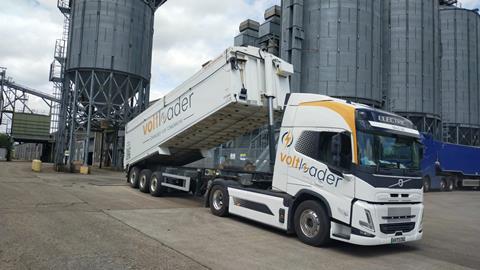In an exclusive interview, Freight Carbon Zero spoke with Voltloader CEO Dave Rose, and Head of Haulage Services, Bertie Steggles, about the company’s innovative approach to zero emission logistics in the UK’s agricultural sector.

Voltloader, founded two years ago, has emerged as a unique player in the transport industry, operating as both a haulier and a Charging infrastructure provider. The company currently runs what it believes to be the UK’s only all-electric truck fleet, focusing initially on bulk tipping for grain transport in the east of England.
“We have 12 contracts with various grain merchants and food supply chain businesses,” says Bertie Steggles, Head of Haulage Services at Voltloader. “We’re moving raw product for them, but increasingly being asked to move further through the supply chain to provide transport for other products.”
This expansion into transporting ‘other’ products in the supply chain will create a closed loop in sustainability. “It’s great that grain is being moved from farm or store into processing facilities, but if it’s then being moved out of the processing sites on diesel vehicles, it loses some of the sustainability value we’ve added at the earlier stage,” adds Steggles.
The company’s fleet currently consists of three Volvo FM electric 4x2 tractor units, capable of achieving a 24.5-tonne payload thanks to specially adapted tipping trailers. “To achieve the maximum payload possible on a 4x2 Battery electric truck, we’ve moved weight off the tractor unit and onto the rear of the trailer with a customised tipping trailer. Without the adaptations we’d probably only achieve 22-23 tonnes of payload,” explains Steggles.
The vehicles themselves have also exceeded expectations, with Steggles noting: “We have done over 200 miles on a single charge in a normal day’s operation.” This performance surpasses even Volvo’s stated capabilities, demonstrating the real-world potential of electric haulage in demanding applications.
With an ambition to grow from its current two EVs to tens of vehicles, a substantial fleet expansion appears to be on the horizon, with Steggles revealing “we will soon be putting in orders for our next lot of EVs”.

Hybrid hero: haulier and charge point operator
Voltloader’s unique selling point is its dual focus on both electric vehicles and charging infrastructure. “We decided we were going to invest in both electric trucks and electric chargers,” Voltloader CEO Dave Rose tells FCZ, highlighting the company’s strategy to overcome the ‘chicken-and-egg’ problem of ev adoption in the haulage sector.
At its main site just outside of Peterborough, Cambridgeshire, Voltloader currently has two AC 43kW chargers (used for overnight charging) and a 200kW Charger (for within-day charging).
“Quite often we’ll do a couple of runs in the morning, then a quick top-up charge with the fast charger at lunchtime, and then another delivery in the afternoon. The slower chargers are then used to charge the vehicles overnight,” says Steggles.
The electricity used for charging the vehicles from Voltloader’s own sites is green energy, “meaning we are not just tailpipe emission free, but fully emission free” adds Rose.
Growth and expansion
The company is actively expanding its charging network, with plans to install ultra-rapid chargers at both their own sites and customer locations.

“We’re now in the process of installing chargers at our first couple of partner sites and we are in the process of identifying and developing further sites across East Anglia, where we’d like to invest in installing ultra rapid chargers,” Steggles reveals.
Voltloader’s innovative business model includes shared commercial arrangements for charging infrastructure at customer sites, creating what Rose describes as “pretty innovative commercial arrangements around how we fund those and how we work with the customers”.
With plans to grow its charging network across East Anglia and across the UK through a mix of its own sites, customer sites and third-party collaborations, Voltloader is open to conversations with interested parties, including other road transport operators, around collaboration and joint ventures.
“We already have a shared user agreement with Welch’s Transport which allows us to do a top-up charge mid-route and do extra work, meaning we are more efficient, removing the need to go all the way back to our site to recharge,” says Steggles, “and our charger is open to them as well for their EVs.”

The collaboration with Welch’s is working well and is where Rose believes the future success for electrifying the road freight sector lies. “I think the real way that electrification is going to take off quicker is by companies coming together and being collaborative in their approach,” he says. “We want to create an open network of multi-charging hubs that benefits everyone.”
With a vision to support the whole cereal supply chain electrify, ambitious growth plans, an aim to create an open charging network and foster collaboration within the industry, Voltloader’s journey is certainly going to be an interesting one to watch.


















